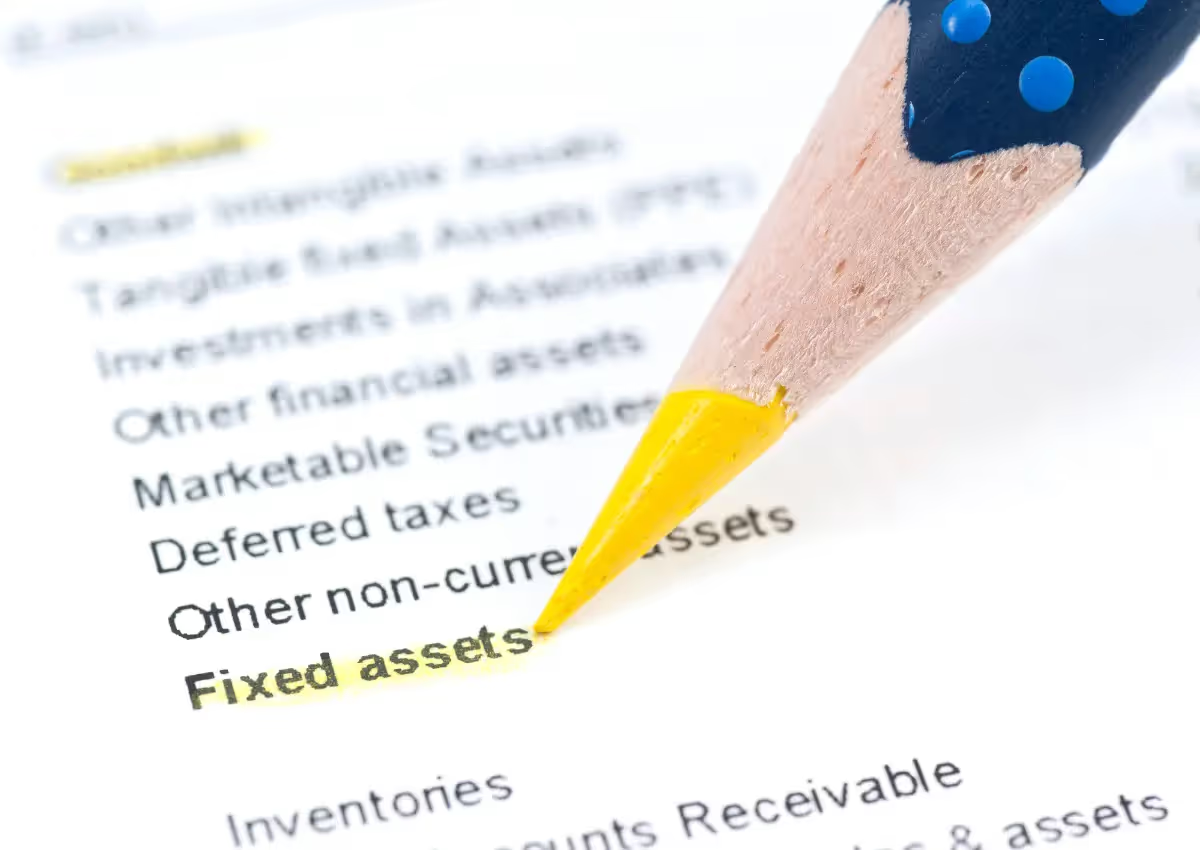Fixed assets: Definition, examples, and accounting basics
Learn the basics of fixed assets, why they’re important to your business, and how to account for them accurately in your financial statements.

Fixed assets lay the foundation for a company's infrastructure, providing the essential resources for operations. Almost every business has fixed assets, so it’s crucial to understand how to record them on the balance sheet.
Read on to learn the basics of fixed assets, why they’re important to your business, and how to account for them accurately in your financial statements.
What is a fixed asset?
Fixed assets—also known as property, plant, and equipment (PP&E)—are long-term, tangible assets that a company uses in its operations and are not intended for sale. These assets are expected to provide economic benefits to the company for more than one accounting period, typically a year.
Examples of fixed assets include physical assets such as land, buildings, machinery, equipment, vehicles, furniture, computers, and software. All these items are recorded on a company's balance sheet as assets.
What’s the difference between fixed assets and current assets?
The main difference between fixed assets and current assets is the length of time the business holds the asset—fixed assets are held for more than one year, while current assets are held for less than one year.
Unlike fixed assets, current assets are expected to be converted into cash, sold, or consumed within a company's operating cycle. These assets are crucial for a company’s liquidity, as they represent the resources available to meet short-term obligations.
How does fixed asset depreciation work?
The cost of a fixed is allocated over the useful life of the asset. The useful life is the estimated number of months or periods an asset will be useful to a company. This accounts for the fact that assets depreciate over time due to wear and tear, obsolescence, and other factors.
There are multiple depreciation methods, including:
- Straight-line depreciation, the most common method, where the same amount is depreciated each year over the asset’s useful life
- Declining balance, where a higher depreciation expense is recorded in the earlier years of the asset’s useful life
- Units of production, the least common method, where the asset is depreciated based on the usage of the asset, like hours used or units produced
While most assets depreciate in value over time, there’s one notable exception: Land is not eligible for depreciation.
Why are fixed assets important?
Fixed assets are important for businesses for several reasons:
- Contribute to the company’s long-term value: Fixed assets have long-term value and contribute to a company’s financial health. They represent substantial investments and are expected to generate revenue and support growth over an extended period. Additionally, assets like land and buildings tend to appreciate. This appreciation can contribute to the overall worth of the business.
- Identify the company's financial position: Fixed assets are recorded on the balance sheet, providing insight into the organization's total asset base. By accurately valuing and managing fixed assets, businesses can assess their net worth, solvency, and ability to meet financial obligations.
- Increase production capacity: By purchasing fixed assets like equipment, a company can increase its production and therefore increase its profits.
- Enhance competitive advantage: Well-maintained fixed assets can give a company a competitive edge in the market. Up-to-date and high-quality equipment or facilities can improve the quality of products or services, attract customers, and differentiate a business from its competitors.
How do fixed assets impact financial statements?
Fixed assets have an impact on a company's balance sheet, income statement, and statement of cash flows.
- Balance sheet: The value of fixed assets is reported on the balance sheet at their historical cost less any accumulated depreciation or impairment. This information is crucial for investors, creditors, and stakeholders in assessing the company's financial health, its ability to generate future cash flows, and the overall value of the business.
- Income statement: A fixed asset’s depreciation expense, which represents the allocation of the asset's cost over its useful life, is recorded as an expense on the income statement. This expense reduces the company's net income, thus affecting its profitability.
- Statement of cash flow: The purchase of fixed assets appears as a negative investing activity on the cash flow statement. Conversely, the sale of a fixed asset is reflected as a positive cash flow within the same section. These transactions influence a company’s cash position, showing how funds are allocated to long-term investments in fixed assets and how such investments affect the overall liquidity available for other business operations.
Can fixed assets be revalued?
The most common accounting approach for fixed assets is the cost model, which records assets at their historical cost and subtracts depreciation or impairment. This model doesn’t allow for upward revaluation of fixed assets, making for straightforward calculations.
However, some businesses may choose to use the revaluation model, which allows for increasing or decreasing the value of a fixed asset on an annual basis based on its fair market value.
If an asset is written down, meaning the value is decreased, International Financial Reporting Standards (IFRS) allow for this to be reversed in subsequent revaluations. However, the Financial Accounting Standard Board’s (FASB) U.S. Generally Accepted Account Principles (GAAP) don’t allow for the reversal of a fixed asset’s value once it’s written down.
How do you maintain fixed asset records?
To maintain fixed asset records, companies should keep detailed documentation of each asset, including its acquisition cost, the date the asset was placed in service, useful life, depreciation method, and any subsequent changes or improvements. These records should also be regularly updated and reconciled with physical inventory to ensure accuracy.
What are the common journal entries for fixed assets?
You’ll typically use the following journal entries throughout a fixed asset’s lifecycle:
- Capitalization: Records the purchase or acquisition of the fixed asset.
- Depreciation: Gradually expenses the cost of the asset over its useful life.
- Transfer: Moves the asset between subsidiaries or departments, adjusting records accordingly.
- Modification: Records a change in the asset’s value.
- Split: Splits an asset from a bulk quantity into smaller units.
- Disposal: Removes the asset from the books and records any gain or loss from its sale or disposal.
Manage your fixed assets with NetAsset
Managing fixed assets manually can be time-consuming, and generic solutions often create more issues than they solve.
NetAsset was created by accountants who understand the challenges of fixed asset management. It offers everything you need to manage your fixed assets throughout their lifecycle, streamlining processes to give you crystal-clear reporting and audit trails.
NetAsset gives you the flexibility to customize asset adjustments, depreciation, and maintenance. It automatically generates depreciation schedules for all your assets using common or customized depreciation methods.
Plus, it works with any ERP, with a NetSuite-native solution and a standalone solution that can be uploaded to all ERPs and issue alternate reporting for your tax software.
Want to explore how NetAsset can streamline your fixed asset management? Request a personalized demo.

